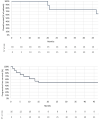Sarcoid-like Granulomatosis Associated with Immune Checkpoint Inhibitors in Melanoma
- PMID: 35740604
- PMCID: PMC9221061
- DOI: 10.3390/cancers14122937
Sarcoid-like Granulomatosis Associated with Immune Checkpoint Inhibitors in Melanoma
Abstract
We aimed to review the clinical and biological presentation of granulomatosis associated with immune-checkpoint inhibitors (ICI) in patients with melanoma and to explore its association with classical sarcoidosis as well as with cancer response to ICI. To this end, a retrospective study on 18 melanoma patients with histologically proven ICI-induced granulomatosis over a 12-year period in a single center, as well as on 67 similar cases reported in the literature, was conducted. Results indicate ICI-induced granulomatosis is an early side effect (median time to onset: 2 months). Its clinical presentation, with predominant (90%) thoracic involvement, histopathological appearance and supposed underlying biology (involving the mTOR pathway in immune cells, Th17 polarization and TReg dysfunction) are indistinguishable from those of sarcoidosis. Moreover, it appears to be associated with ICI benefit (>65% objective response rate). Evolution is generally favorable, and symptomatic steroid treatment and/or ICI discontinuation are rarely necessary. ICI-associated granulomatosis is critical to explore for several reasons. Practically, it is essential to differentiate it from cancer progression. Secondly, this “experimental” sarcoidosis brings new elements that may help to address sarcoidosis origin and pathophysiology. Its association with ICI efficacy must be confirmed on a larger scale but could have significant impacts on patient management and biomarker definition.
Keywords: granulomatosis; immune checkpoint inhibitor; immunotherapy; mTOR; melanoma; sarcoidosis.
Conflict of interest statement
Caroline Robert is consultant for BMS, Roche, Novartis, Pierre Fabre, Sanofi, MSD, Pfizer and AstraZeneca and scientific co-founder of Ribonexus. Emilie Routier is consultant for BMS and Novartis and is a sub-investigator in clinical trials of BMS, Novartis, Pierre Fabre, Roche, Merck Serono, MSD, Idera, Iovance, Regeneron and Debiopharm. Olivier Lambotte: paid expert testimony and consultancy fees from BMS France, MSD and Astra Zeneca; expert testimony for Janssen, grants from ViiV and Gilead. The other authors declare no conflict of interest. The funders had no role in the design of the study; in the collection, analyses or interpretation of data; in the writing of the manuscript; or in the decision to publish the results.
Figures



References
-
- Schadendorf D., Hodi F.S., Robert C., Weber J.S., Margolin K., Hamid O., Patt D., Chen T.-T., Berman D.M., Wolchok J.D. Pooled Analysis of Long-Term Survival Data from Phase II and Phase III Trials of Ipilimumab in Unresectable or Metastatic Melanoma. J. Clin. Oncol. 2015;33:1889–1894. doi: 10.1200/JCO.2014.56.2736. - DOI - PMC - PubMed
-
- National Cancer Institute . Common Terminology Criteria for Adverse Events v3.0 (CTCAE) National Cancer Institute; Bethesda, MD, USA: 2006.
LinkOut - more resources
Full Text Sources
Miscellaneous

